| Release List | Reviews | Price Search | Shop | Newsletter | Forum | DVD Giveaways | Blu-Ray/ HD DVD | Advertise |
| Reviews & Columns |
|
Reviews DVD TV on DVD Blu-ray International DVDs Theatrical Reviews by Studio Video Games Features Collector Series DVDs Easter Egg Database Interviews DVD Talk TV DVD Talk Radio Feature Articles Columns Anime Talk DVD Savant HD Talk Horror DVDs Silent DVD
|
DVD Talk Forum |
|
|
| Resources |
|
DVD Price Search Customer Service #'s RCE Info Links |
|
Columns
|
 |
Joan Collins Collection |
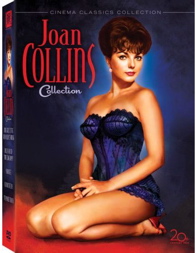
|
Joan Collins Collection Fox 1955-60 Street Date July 10, 2007 49.98; titles available separately at 19.98 Starring Joan Collins |
The Joan Collins Collection is an interesting quintet of the English star's Fox contract pictures, including three of her better vehicles. The Girl in the Red Velvet Swing should have been a star-maker but fell short. Sea Wife has a terminally flawed concept and Stopover Tokyo is a sub-par re-think of a Mr. Moto script, but both are fairly entertaining anyway. For Rally 'Round the Flag, Boys! and Seven Thieves Joan has been demoted to supporting status, but they're plum roles that allow her to do what she does best -- play comedy and dance.
All of the transfers are excellent -- Fox is scoring high marks these days for its great transfers -- and the extras are interesting too. Author Aubrey Solomon provides commentaries for all the films, but they're not full length tracks and they vary in quality. I explain below.
|
The Girl in the Red Velvet Swing 1955 / Color / 2:35 anamorphic widescreen / 109 min. Starring Ray Milland, Joan Collins, Farley Granger, Luther Adler, Cornelia Otis Skinner, Glenda Farrell, Frances Fuller Cinematography Milton R. Krasner Art Direction Maurice Ransford, Lyle R. Wheeler Film Editor William Mace Original Music Leigh Harline, Edward B. Powell Written by Charles Brackett, Walter Reisch Produced by Charles Brackett Directed by Richard Fleischer The Girl in the Red Velvet Swing has been reviewed separately, here. Press information and online listings give the film's aspect ratio as 'full screen' but this is false: it's presented at the proper 2:35. |
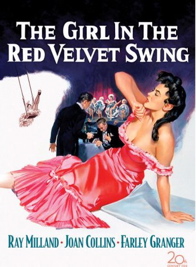
|
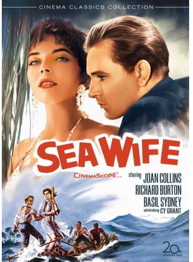
Sea Wife
1957 / Color / 2:35 anamorphic widescreen / 82 min.
Starring Joan Collins, Richard Burton, Basil Sydney, Cy Grant, Ronald Squire
Cinematography Edward Scaife
Art Direction Artur Lawson
Film Editor Peter Taylor
Original Music Kenneth V. Jones, Leonard Salzedo
Written by George K. Burke from a novel by J.M. Scott
Produced by André Hakim
Directed by Bob McNaught
It's ironic that Sea Wife is about castaways, because the film itself appears to have been marooned shortly before shooting began. European producer Hakim assembled an intriguing cast for Italian director Roberto Rossellini, only to have Fox reject the script Rossellini wanted to use. Ingrid Bergman had just come out from exile with the previous year's Anastasia, but Sea Wife was a touchy story about a nun tempted while adrift in a rubber raft, and Fox surely wanted to avoid scandals. The film was eventually directed by its production manager Bob McNaught, who does a creditable job. The problem is that the sanitized story leaves nothing but Campy hints of forbidden content that the film never addresses. Sea Wife is colorful, reasonably well acted and almost completely unsatisfying.
Singapore evacuates in 1942 and a ship jammed with refugees is torpedoed by the Japanese. Before you can say Rub a Dub Dub, four survivors end up in a dinky yellow raft, unaccountably using code names instead of their real ones. Bulldog (Basil Sydney) is a rich racist through and through, as demonstrated by his previous uncouth behavior on board ship. "Number 4" is the ship's purser, an intelligent and resourceful black man (Cy Grant). Handsome Biscuit is put in charge of the biscuit tin, and beautiful Sea Wife (a sailor's term for a mer-maiden) takes charge of the water bottle. The problem is that Sea Wife is actually Sister Teresa, a nun who has lost her habit while diving overboard. She keeps this a secret for undisclosed personal reasons. Only Number 4 knows her identity and he keeps mum. Why?
The adventures are stock but competently dramatized. The survivors deal with dwindling food and water, trap a pelican to eat ("It's bad luck to kill a seabird") and have a run-in with a Japanese sub, which refuses to help them until Number 4 tells them something in Japanese, probably that Sea Wife is a nun. They end up on a lonely island and build a raft to take them North to inhabited territory. Biscuit declares himself to Sea Wife, who won't tell him who she is and instead entreats him to not touch her, while she hyperventilates and clutches at a nearby palm tree. Meanwhile, Bulldog is alarmed by Number 4's finding of a machete. Number 4 has saved all of their lives several times, but Bulldog is adamant not to cede power to a negro, and eventually takes drastic action.
All of this is told in flashback from a London mental hospital, where Biscuit has come in search of Sea Wife, whose name he never learned. The story uses High Contrivances and Misdemeanors to frustrate Biscuit's attempts to find his companions from the life raft years before, and it does its best to end on a note of bittersweet irony. The problem is that the film is dramatically inert. Nothing ever happened between Biscuit and Sea Wife. The closest thing to a suggestive scene is when he surprises her with a freshly caught lobster, and she runs away giggling. Hot stuff, that. In the absence of deep romance there can be no romantic tragedy, just a guy who can't connect with a girl. The racial subplot is given equal weight and is also clumsily sidestepped by a plot contrivance. Little develops except Bulldog's malice, and a convenient shark swims into the movie to blur the lines of moral responsibility. In a way, nothing of consequence happens.
Richard Burton mopes better than anybody. He looks trim; the drinking must have caught up with him just a year or two after this picture. Basil Sydney and Cy Grant are excellent in their characterizations and are only let down by the obvious contours of the script, which forces them to represent Civil Rights ideas instead of people. And poor Joan Collins is once again stuck in a role that plays against her appeal. She's 'glamorously plain' throughout, wearing mostly one cotton nightgown that remains modest no matter what the weather. She's also one of those nuns who wears beautiful makeup at all times, even when adrift at sea. Add those factors to the predictable audience resistance to accepting Joan Collins as a nun, and the film was probably a non-starter.
I'm going to guess that Sea Wife was filmed in Jamaica because a beach waterfall looks just like one in Dr. No a few years later. The daytime raft scenes are excellently filmed, and the nighttime studio work is pretty good as well. The sinking ship at the beginning is a barely adequate miniature. London residents can wax nostalgic over the many beautiful images of downtown streets in 1957 ... that surely look very different now. There's not a McDonald's in sight.
The disc of Sea Wife is another excellent Fox video restoration. The clear sound highlights the film's dreadful title song. Author Aubrey Solomon's audio commentary plays only over selected scenes, a good idea I first noticed on a Warners' disc. For this title Solomon's comments are well-chosen and to the point, but one's never sure whether he'll come back in with another comment, or if it's time to skip ahead to the next chapter. As with the other titles in the collection, Sea Wife has photo and artwork galleries, a restoration comparison, an Interactive press book and a trailer. The criminally deceptive box artwork combines part of the film's poster with doctored portraits of Burton and Collins. She wears a bikini top and earrings!
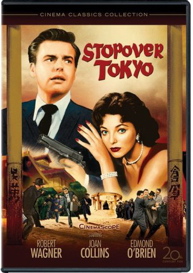
Stopover Tokyo
1957 / Color / 2:35 anamorphic widescreen / 100 min.
Starring Robert Wagner, Joan Collins, Edmond O'Brien, Ken Scott, Reiko Oyama, Larry Keating, Sarah Selby, Solly Nakamura
Cinematography Charles G. Clarke
Art Direction Eddie Imazu, Lyle Wheeler
Film Editor Marjorie Fowler
Original Music Paul Sawtell
Written by Richard L. Breen, Walter Reisch from a novel by John B. Marquand
Produced by Walter Reisch
Directed by Richard L. Breen
Stopover Tokyo makes one realize that the fortunes of a contract Hollywood star are completely dependent on the casting choices of the boys in the front office. Joan Collins was slotted into one indifferent or undesirable film after another. This tepid espionage picture allows her to be an airline clerk and a babysitter, and not a whole lot in between. American 'counter-intelligence agent' Robert Wagner stops in periodically to see her while fumbling around tracing Commies in Japan. He sticks to his cover story about being married, so the most they manage is a kiss or two.
Wagner is no James Bond. He plays Mark Fannon, assigned to deliver a message but then forced to stay on when his superior Nobika (Solly Nakamura) is murdered.
1 Mark parks Nobika's orphaned child Koko (Reiko Oyama) with Tina Llewellyn (Collins) while getting nowhere on his mission. He lies to Tina and to the Japanese police. Eventually the police end up doing most of Mark's work for him -- they know he's a spy but he never comes clean to Tina, who loves him. She intuits that his wedding ring is false but accepts the fact that his secret job will never allow him to have an honest relationship with a woman. Fannon knows he can make no lasting personal attachments but bonds with both Tina and Koko anyway.The plot is silly. Messages and letters are lost or stolen, and bad guy George Underwood (Edmond O'Brien) makes his villainy obvious by dogging Fannon's trail. Nobita describes the opposition as "The vodka and caviar set." The undercover Commies want to assassinate the American Ambassador, see, and make it look as if the Japanese did it. That is somehow supposed to drive Japan into the Russian sphere of influence. The Commies, we are told, are assassinating people on a daily basis. Underwood's cover company is hidden above an art gallery, which should be a dead giveaway: in paranoid Cold War movies, Commies always use art and culture as a shield.
Stopover Tokyo's commentary is very sparse, so much so that it's difficult to decide when one is meant to skip to the next chapter. This time Aubrey Solomon's good comments (besides Collins' joke that the movie should be called Stop Over-acting) center on his assertion that the film began as a Mister Moto story. The Moto character is distributed between Nobita and a methodical Japanese policeman. When you think of it, the Tokyo cop does more to solve the mystery than Fannon does.
Joan looks very pretty here, poured into a Chinese-styled dress or two and coiffed to look like Fox's version of Elizabeth Taylor. It's too bad that she does little more than pour tea and play an exceedingly indulgent hostess.
The DVD of Stopover Tokyo is a flawless transfer. The travelogue photography looks great. The 4.0 Dolby surround track is accompanied by a track in Spanish and subs in English, Spanish and French. Aubrey Solomon's commentary, as mentioned above, is so sparse that one has to scan about finding its pieces. Among the by-now standard set of extras (don't make me repeat them!) is a quickie collection of newsreel bits and screen test fragments. We see Joan in 1952 receiving some kind of prize with Forrest Tucker, and acting up a storm in a screen test for The Wayward Bus.
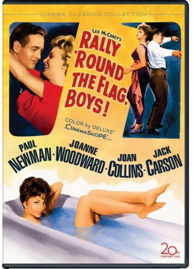
Rally 'Round the Flag, Boys!
1958 / Color / 2:35 anamorphic widescreen / 107 min.
Starring Paul Newman, Joanne Woodward, Joan Collins, Jack Carson, Dwayne Hickman, Tuesday Weld, Gale Gordon, Tom Gilson, O.Z. Whitehead, Robert Banas
Cinematography Leon Shamroy
Art Direction Leland Fuller, Lyle Wheeler
Film Editor Louis Loeffler
Original Music Cyril J. Mockridge
Written by Claude Binyon, Leo McCarey from a book by Max Schulman
Produced by Leo McCarey
Directed by Leo McCarey
It seems that only toward the end of the fifties, after Fox had already squandered Collins' appeal on less-than-optimal vehicles, she began to luck into roles that displayed her talents as a comedienne and slightly Campy screen vixen. Fox wanted Jayne Mansfield for Leo McCarey's Rally 'Round the Flag, Boys! but hot stars Paul Newman and Joanne Woodward held out for Joan, who they intuited would provide the perfect vampy contrast for Max Shulman's broad satire.
Rally 'Round the Flag, Boys! is cute and funny but no classic, mainly because it's not half as witty as it needs to be, and Leo McCarey's direction is mostly a big zero. The satirical targets are old-hat or corny, repeating trends in late 50s comedy done better elsewhere. That's a shame, because the movie has a fun attitude and is frequently hilarious anyway.
The story combines I Love Lucy and The Seven-Year Itch, with a heavy dose of a service comedy. Harry and Grace Oglethorpe Banneman (Paul Newman and Joanne Woodward) can't find time for each other because she's tied up with civic meetings and committees. Harry commutes to New York every day; his problem is that his drinks in the bar car keep getting knocked out of his hand (hee hee), a pattern that persists at home with the kids tossing sofa cushions. While Grace can't find time for him in bed, he's also being tempted by knockout lonely housewife Angela Hoffa (Joan Collins). Enter the U.S. Army, which crashes into the town of Putnam's Landing with a top-secret base. Grace organizes a NIMBY revolt and dispatches a reluctant Harry to the Pentagon, where the Army forces him to run interference for the secret base by fully activating his Navy Reserve status. In a predictable (if genuinely funny) development, Angela tricks Harry into a honeymoon suite just as Grace shows up to 'surprise' her needy hubby.
Divorce looms; Harry uses family blackmail to get past the furious Grace and visit his boys. He tangles with both the amorous Angela and moronic Captain Hoxie (Jack Carson), a lummox who disgraces the Army on nationwide television. Meanwhile, the girls of Putnam's Landing go limp for the handsome soldiers, especially Comfort Goodpasture (Tuesday Weld), a frisky teen who's discovered that, "Boys are like, Wow!" Not pleased is local cycle slob Grady Metcalf (Dwayne Hickman), who suffers through (or makes us suffer with) Marlon Brando imitations. Harry's public relations solution is to turn Grace's annual Putnam's Landing Pageant into a peacemaking jubilee between the Army and the civilians. The only problem is that Grady's juvenile delinquents do not have peaceful intentions.
Rally 'Round the Flag, Boys! is a real mixed bag. It starts off with a thuddingly dated verbal joke about the Indians scalping the first white puritan as he got off the boat. Newman and Woodward are really good with their "Lucy & Ricky" clowning, showing both style and invention in their exaggerated gestures and faces. It's not as easy as it looks and Woodward's Grace is at least more complicated than Lucille Ball's Lucy. Grace takes on community committee responsibilities with an infantile glee, while Harry retreats to silly 'private movie' fantasies of seducing Grace like the Sheik of Araby.
The Army satire is all overdone, like a half-baked return to The Miracle of Morgan's Creek. Jack Carson's Captain Hoxie is so broad, he belongs in McHale's Navy or Hogan's Heroes. The clash between the southern soldiers (who call local girls "Boojum" and even write songs about it) and the local J.D.'s is pretty tame, although Dwayne Hickman's brief clowning will amuse Dobie Gillis fans. The standout is Tuesday Weld, a mass of squirmy giggles whose middle name should be Date Rape. The Rock 'n Roll jive talk is phony but she's a keeper, obviously a major talent. She went right to the Dobie Gillis show as well. Her orgasmic reaction to a song about Boojum must have inspired the giddy cashmere sweater scene in the later Lord Love a Duck.
Joan Collins is the best thing in the movie, showing real flair for farce as the captivating husband poacher Angela Hoffa. The dame just wants attention and is too potent to be intimidated by the script's sometimes-lame machinations -- Harry spilling potent perfume on his suit, that sort of thing. The picture comes alive whenever she pulls her seductive tricks on Harry. Doing an ersatz Oriental dance in the hotel suite, Joan seems to be lampooning her full-on sexpot role in her big debut Land of the Pharaohs. As she's already an exaggeration of sex appeal, her slightest gyrations and come-hither looks easily match Newman's eye rolling panic and Woodward's cross-eyed vexation. Collins is simply great in these brief choreographed dance moments.
The story comes together with an Indian-Pilgrim pageant that reminds of the Manhattan Indian prologue of The Seven-Year Itch. While Joanne Woodward narrates, Collins' Angela Hoffa does a Charleston-inflected 'fertility' dance. The Pilgrims (the Army) land, and Pocahontas (Tuesday Weld) begs for the life of her Pilgrim John Smith. That's when the Indians (Dwayne Hickman's juvenile delinquents) start a brawl, tying firecrackers to the soldiers, etc. It's a bit silly but buoyed by Collins' hilarious pantomime.
Leo McCarey's non-direction simply parks the camera at medium distance from most scenes, as if he had no idea what to do with the CinemaScope frame. Compensating somewhat is the creative camerawork of Leon Shamroy, which breaks free of the standard Fox flat lighting schemes. David Hedison narrates while Gale Gordon does his best to underplay an Army General. The satire is toothless: we're to assume that the protesting mothers are foolish and that the top-secret base is no threat to the community. Murvyn Vye is a standout as Angela's two-fisted husband.
Rally 'Round the Flag, Boys! looks superb; it's yet another Joan Collins treat that's been hiding behind terrible pan-scanned TV prints for 50 years. Only one optical transition must have been uncorrectable; you'll see it click by. Also, in a couple of shots edge enhancement has resulted in the 'shark tooth' syndrome, making it look as if Joan has gaps in her teeth. The audio is in 4.0 Dolby Surround, with additional tracks in Spanish and French and subs in English and Spanish.
Aubrey Solomon's commentary track skips around the movie to just three or four pertinent scenes. It's almost exclusively a description of what we're watching on screen, so there's little or no reason to listen to it. The IMDB and publicity notes mention unbilled George Axelrod as a screenwriter, and we would have liked to hear why he didn't get credit. Rally does share a number of factors with Axelrod's The Seven-Year Itch and Lord Love a Duck. A full compliment of extras is included. Leo McCarey and Bob Hope host the awful trailer, shamelessly plugging McCarey's previous Oscars while pretending to be exhausted from laughing at a screening of the movie.
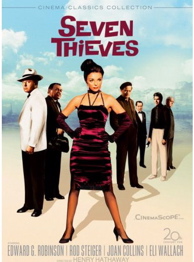
Seven Thieves
1960 / B&W / 2:35 anamorphic widescreen / 102 min.
Starring Edward G. Robinson, Rod Steiger, Joan Collins, Eli Wallach, Alexander Scourby, Michael Dante, Berry Kroeger, Sebastian Cabot
Cinematography Sam Leavitt
Art Direction John DeCuir, Lyle Wheeler
Film Editor Dorothy Spencer
Original Music Dominic Frontiere
Written and Produced by Sydney Boehm from a novel by Max Catto
Directed by Henry Hathaway Seven Thieves is a solid caper picture in the standard mode: a group of crooks come together to swindle a Monte Carlo casino out of four million dollars. Joan Collins is the only dame in the gang and enjoys a showcase role as a sexy cabaret dancer while playing off of impressive leading men Edward G. Robinson, Rod Steiger and Eli Wallach. Sydney Boehm's production isn't as expensive as it looks, as none of the main players went to the south of France. Sam Leavitt's crisp B&W photography hides the many process shots, but some of the doubles for Steiger and Robinson are easy to spot.
Boehm also scripted, and between his clever dialogue and Henry Hathaway's assured direction the movie is in good hands. The caper is a near-generic construction elevated by good actors in each role. Robinson is the kindly brain behind the operation; he masquerades as a doctor in the big heist, which is pulled off during a big casino party. Steiger is his protégé, a tough taskmaster who keeps the others in line. To obtain invitations to the big party, dancer Joan Collins has successfully seduced the Casino's assistant manager, Alexander Scourby. Musician Eli Wallach will pretend to be a cantankerous crippled millionaire. Michael Dante is a safecracker afraid of heights and Berry Kroeger (Gun Crazy) a surly German auto expert. The heist involves sneaking in disguised as wealthy patrons, creeping along ledges of the casino building and using a clever trick to escape with the money. Only part of the caper is explained beforehand, allowing us to discover some of the surprise elements as the plan unfolds.
The scheme relies on several rather crucial points of cooperation by the casino, not to mention an assumption that no idle passers-by will happen to catch Steiger and Dante creeping along the outside of the building. After they slide along the exterior masonry, they appear back in the casino in perfectly clean white dinner jackets! The key to a successful caper film is not how perfectly it is planned, but how well the participants react when things go wrong. The excitable Robinson improvises beautifully when Wallach balks, and Collins bluffs her way through a tight spot when a snooty casino guest recognizes her as the hoochy coochie dancer from Cannes. Seven Thieves balances its tone perfectly ... we can't tell if all will go well, or if something trivial will doom the enterprise, as in Jules Dassin's Topkapi.
2Joan Collins is almost as impressive in B&W as she is in color, and the role gives her a chance to stretch. Publicity handouts claim that famous striptease artist Candy Barr rehearsed her dance numbers. The scene where Joan dances with Eli Wallach's teasing saxophone is both exotic and erotic. The script also allows Joan some decent scenes with Rod Steiger, fending off questions about her murky past. As it turns out, she's just another girl looking for a strong and trustworthy guy.
The DVD of Seven Thieves presents the slick picture in an excellent enhanced transfer. After a couple of minutes the B&W stops looking dull in comparison to the other movies, and we accept most of the mattes and other special effects that make it look as if the cast were all transported to France. Dominic Frontiere's jazzy score helps out the suspense scenes as well as the hot-cha dance numbers.
The extras include the usual galleries, interactive menu, etc; Edward G. Robinson narrates the trailer. Aubrey Solomon's commentary is again a fragmented set of isolated 'portions' difficult to locate. When I did find one, Solomon was once again just explaining the plot or adding a fairly useless anecdote: A safe-vault expert was on the set; Joan's dress was very tight. We get the idea that a Fox vendor hired Mr. Solomon for one session that could be spread across all five films.
3A text insert pamphlet in the Joan Collins Collection contains 'facts' carefully picked from publicity handouts and Collins' autobiography. It asks us to believe that Roberto Rossellini chose contract star Joan Collins for Sea Wife, and that she extensively researched the role, even checking into a convent to do so. The insert also 'spoils' the ending of Seven Thieves, so avoid it. Joan Collins' movies are very entertaining and some of the extras appeal (I like the little post-card stills now), but dragging through a feature to hear a few innocuous commentary remarks is no fun. Fox should either go back to commissioning expert, researched commentaries -- Janine Basinger is always good, as is Robert S. Birchard -- or do without.
On a scale of Excellent, Good, Fair, and Poor,
Joan Collins Collection rates:
Movie: Swing: Excellent -; Wife: Good -; Tokyo: Good -; Flag: Good; Thieves: Excellent
Video: Swing: Excellent; Wife: Excellent; Tokyo: Excellent; Flag: Excellent; Thieves:
Excellent
Sound: Swing: Excellent; Wife: Excellent; Tokyo: Excellent; Flag: ; Thieves: Excellent
Supplements: Commentaries with Aubrey Solomon, galleries, Interactive Press Books, trailers, restoration comparisons, collector postcard 'lobby cards'. Isolated score track on The Girl in the Red Velvet Swing
Packaging: Five slim cases in card sleeve
*** ½
Reviewed: July 10, 2007
Footnotes:
1. The actor playing Nobika is listed as 'Solly Nakamura', which appears to be a nickname for Satoshi "Tetsu" Nakamura, featured actor in many Toho monster and science fiction movies. He's Canadian-born, which helps account for his excellent English. The IMDB gets it all wrong by listing two separate men as Solly and Tetsu. Thanks to Stuart Galbraith IV's books on Japanese cinema for this info.
Return
2. I wonder if Seven Thieves, with Joan Collins in to 'distract' a casino employee, prompted a wonderful cartoon in an old copy of Mad Magazine. The big cheese crook is lining up his confederates for a heist. Among the thugs is a sexy woman in a tight dress, looking a lot like Joan Collins. Next to her is a dumpy little clown, juggling three balls in the air. The big cheese guy explains their assignments: "Lefty and me will carry the loot. Bobo here will (wink wink) 'entertain' the guard while Miss Shapely breaks open the vault!" Maybe you had to be there.
3. The excellent abbreviated Geena Davis track on The Accidental Tourist is still the best commentary of this kind that I have heard. The track automatically skips forward in the picture to properly background about 30 minutes of great comments from the actress. One doesn't have to guess when it's time to automatically forward to the next commentary bite, as one must do here. Ms. Davis says what she wants to say and doesn't have to pad her remarks, and we aren't forced to sit through the whole feature again.
Reviews on the Savant main site have additional credits information and are more likely to be updated and annotated with reader input and graphics.
Review Staff | About DVD Talk | Newsletter Subscribe | Join DVD Talk Forum
Copyright © MH Sub I, LLC dba Internet Brands. | Privacy Policy | Terms of Use
|
| Release List | Reviews | Price Search | Shop | SUBSCRIBE | Forum | DVD Giveaways | Blu-Ray/ HD DVD | Advertise |





